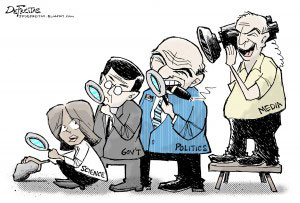Since Republicans took over Congress this month they have been working on covert ways to tip the scale in their favor, trying to pass some pretty low ball bills – which President Obama has threatened to veto.
Regulatory Accountability Act of 2015: The House is expected to easily pass this week a bill that creates so many procedural requirements that it’s near impossible for any new regulations to get through.
"It would effectively make it impossible for science to inform agency actions to protect the public and the environment," says the Union of Concerned Scientists (UCS) in a blog about the bill.
"Written in complex legal language, it will have a simple and drastic result. Any major action an agency proposes to protect the public and the environment will be vulnerable to challenges from corporate special interests. These challenges will enable corporations to question any science on which the agency’s assessment is based. And these challenges will be decided not by knowledgeable scientists but by an administrative law judge with no special scientific expertise. A judge will get to decide whether the science the agency uses is "genuinely in dispute," says UCS.
"This bill is deliberately complicated, you have to be a regulatory lawyer to perceive all the traps. It hamstrings federal agencies with additional procedural burdens when they try to carry out their mandates using the best available science," they say.

Agencies would have their work checked by the Office of Information and Regulatory Affairs, which is known for delaying, diluting and blocking important new safeguards. Federal agencies already take years to issue health and safety standards, and this would create much longer delays – on purpose.
It also directs agencies to write regulations to be as cheap as possible for Big Business, ignoring scientific and economic evidence of what’s needed.
"Any high-stakes rule that miraculously made it through these roadblocks would face unprecedented challenges. It allows industry lobbyists to second-guess the work of respected scientists through legal challenges, sparking a wave of litigation that adds even more costs and delays – while putting the lives, health and safety of millions of Americans at risk," says the Coalition for Sensible Safeguards.
"The costs of blocking crucial standards and safeguards are clear: The Wall Street economic collapse, the Upper Big Branch mine explosion in West Virginia, countless food and product safety recalls and massive environmental disasters including the Dan River coal ash spill in North Carolina and the Freedom Industries chemical spill in West Virginia are just some of the most recent examples," they say.
Tell your representative to VOTE NO on HR185.
Dynamic scoring by the Congressional Budget Office: The agency uses an objective approach to evaluate the financial impact of proposed laws, but Republicans want to change the rules on how it calculates – cooking the books in favor of tax cuts and trickle-down economics.
Cutting Social Security: "There’s a routine transfer that happens between the Social Security retirement trust fund, which is financially secure, and the Social Security disability program, which is under more strain in recent years due to demographic shifts such as aging baby boomers. The new rule prevents this transfer, unless it also includes new revenues or benefit cuts. The disability program is expected to run short of money in 2016, which means that beneficiaries face up to 20% cuts without a transfer between the trust funds. In effect, the rule holds Social Security hostage so that conservatives can extract more concessions in potential entitlement reform," says Center for American Progress.
Wipe Out Wall Street Reforms: Legislation could be passed this week that obliterates reforms in Dodd-Frank, intended to prevent another financial disaster: delay the Volcker rule; dilute rules on private equity firms; loosen regulations on derivatives; weakens transparency. Even if the "Promoting Job Creation and Reducing Small Business Burdens Act" is vetoed, bits and pieces will be added to must-pass bills. Read more here.
Changes to Ethics Rules: have quietly been approved that help politicians to obstruct investigations by the Office of Congressional Ethics, created by Democrats in 2008 to root out corruption.
"By transforming a preliminary, informal fact finding mission into a formal legal proceeding, investigations can be delayed and even derailed altogether," explains Craig Holman, for Public Citizen.
Democrats Release Economic Action Plan
- Financial Transaction Tax (Robin Hood Tax): a 0.1% fee on financial transactions would be combined with tax breaks for top earners. It would generate $1.2 trillion over 10 years to fund a tax break of $2,000 a year for couples earning less than $200,000.
- Executives would no longer be allowed to deduct their enormous bonuses unless they raise employee salaries.
- Incentives for worker training programs
- Nearly triple the child care tax credit and reward people who save at least $500 a year.
